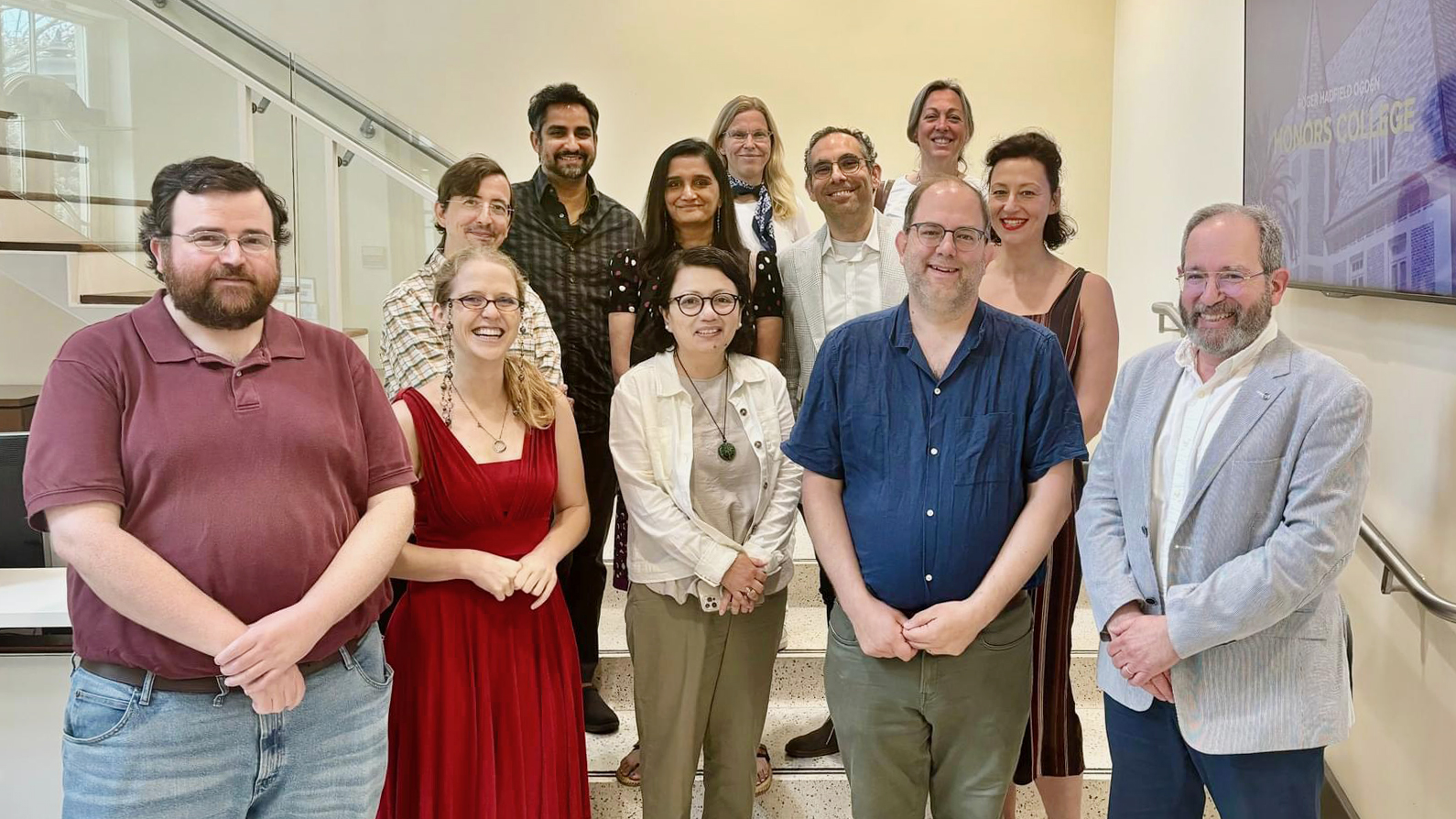Turning the Page to ‘Scholarship First’: Second Book Institute Launches Public Workshops
October 22, 2024
The LSU College of Humanities & Social Sciences Humanities Center’s Second Book Institute assists LSU associate professors in book-based disciplines at every stage of the writing process, from formulating and completing manuscripts to publishing books. Fellows receive detailed feedback on their work in progress from peers as well as from editors at university presses. A new public workshop series kicks off this week.

Left to right in the front row: James Long and Jenny Keegan (LSU Press), Carmela Mattza (fellow, World Languages, Literatures & Cultures), Thomas Lay (Fordham University Press), and Jerry Singerman (University of Pennsylvania Press). Middle row: Kalling Heck (fellow, English and Screen Arts), Pallavi Rastogi (co-director, English), Benjamin Kahan (co-director, English and Women’s, Gender & Sexuality Studies), and Deborah Goldgaber (fellow, Philosophy & Religious Studies and Women’s, Gender & Sexuality Studies). Back row: Prosanta Chakrabarty (fellow, Biological Sciences), Gundela Hachmann (fellow, World Languages, Literatures & Cultures), and Leslie Tuttle (fellow, History).
In academia across America, in hundreds of departments of history, philosophy, and English, associate professors in the humanities are struggling to find time to write books, even though books are a key measure of scholarly accomplishment in their fields.
“The humanities at research universities usually require a second book for promotion to full professor, so not being able to do research and finish your second book means you usually can’t be promoted,” LSU Professor of English Pallavi Rastogi said.
Associate professors in the humanities at U.S. universities often see their careers stall when every day is consumed by teaching, service, and mentoring.
“It’s a structural issue across the humanities and one in dire need of institutional support,” said Benjamin Kahan, LSU professor of English and Women’s, Gender & Sexuality Studies and recent Guggenheim Fellow.
To help, Rastogi and Kahan have launched the Second Book Institute under the auspices of the College of Humanities & Social Sciences’ Humanities Center. The effort has received support from the LSU Provost’s Fund for Innovation in Research and the LSU Office of Research & Economic Development.
The Second Book Institute offers faculty truly unique support for accelerating their agenda-setting research. It is a key part of the Humanities Center’s multidimensional efforts to advance scholarship at every career stage.
Troy Blanchard, Dean of the College of Humanities & Social Sciences
The Second Book Institute at LSU is part of a vanguard of only three Second Book Institutes in the nation so far. The Arizona Center for Medieval and Renaissance Studies at Arizona State University has the RaceB4Race Second Book Institute for scholars studying race in the Renaissance. There is also a new one at the University of Tulsa, which, like LSU’s model, is open to all humanities disciplines with a concentrated week-long workshop in the summer.
“But this year, we’re adding hour-long workshops throughout the academic year as well,” Rastogi said. “We call it the Momentum Workshop Series, where we invite the LSU community to read and provide feedback on our fellows’ works in progress.”
Rastogi is currently working on her third book, Other South Asias: The Indian Subcontinent Through Different Eyes. She is the author of two other scholarly monographs.
“In some ways, it’s a privilege to be able to write a third book, with nowhere near the pressures of a first and second book,” Rastogi said. “But running the Second Book Institute has helped me greatly, as well, and made me hunger for the resources the institute provides.”
In the two years since the Second Book Institute was launched, seven editors from university presses, including Thomas Lay from Fordham University Press, Priya Nelson with Princeton University Press, and Alisa Plant from LSU Press have come to LSU to provide feedback to faculty authors and shop for manuscripts.
“What I love about the institute is that it provides a purely intellectual space for ideas; how to express ideas and how to intervene in a field and make a scholarly impact,” said Kahan, author of two books and currently finishing up a third book, Sexual Aim and Its Misses. “Our fellows come for a week in the summer, and we read manuscripts. We help our fellows come up with a concrete revision plan, work through psychological obstacles and other kinds of obstacles like time management, eldercare, and childcare. We find ways to unlock and excite people.”
“We see fellows leaving electrified, eager to return to their manuscripts,” Kahan continued. “It’s been so inspiring to see other people so on fire.”
To keep this fire going, the Momentum Workshop Series, starting this Thursday, will feature chapters in progress by LSU associate professors Gundela Hachmann (World Languages, Literatures & Cultures), Deborah Goldgaber (Philosophy & Religious Studies and Women’s, Gender & Sexuality Studies), Carmela Mattza (World Languages, Literatures & Cultures), and Jacob Berman (English).
To learn more about the LSU Second Book Institute and the ongoing workshop series, visit the institute’s website or write to organizers Pallavi Rastogi or Benjamin Kahan.


